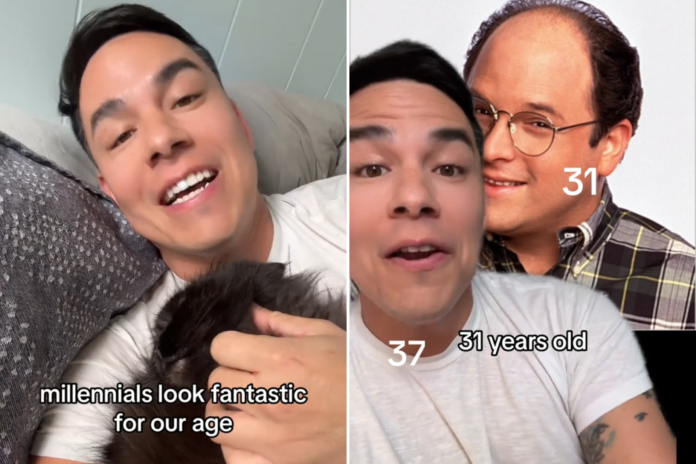“Millennials look fantastic for our age and you cannot tell us otherwise,” asserts Chris Bautista in a TikTok video that has been viewed 6.9 million times.
Using characters from 80s and 90s pop culture, 37-year-old Bautista asserts that today’s millennials—aged 28-43—look significantly younger than people the same age decades earlier.
Using pictures of the cast of Cheers, the parents from 1991 movie Father of the Bride and even Homer Simpson, in a TikTok video he argued that millennials are aging much slower than those in Gen X, aged 44-59 years old.
“I wanted to make my peers feel good because we’re at an age where we’re transitioning from being young into what society would deem as a little older, and it’s a tough transition,” Bautista told Newsweek. “I made that video because I really just wanted to make my peers feel good and to touch on why I think we do look good.”
@bautistud/TikTok
More and more, people who remember AOL and played with Polly Pocket are being mistaken for being younger than they are.
Some have hypothesized that the slow aging of a generation is thanks to the rising popularity of “tweakments” like filler and botox, or the fact that they have a better understanding of the importance of SPF for anti ageing, while others cite the well-analyzed idea that millennials have a sheer inability to “grow up.”
“I think we are sort of the first generation where it became uncool to smoke and we discovered the importance of things like SPF,” Bautista said.
According to Gallup, the smoking rate among U.S. young adults aged 18 to 29 has decreased from an average of 35 percent between 2001 and 2003 to 12 percent in the latest estimate. And that could have a big impact—research shows that smoking can cause a person to age an extra 14 years by the time you reach 70, if you smoke 30 cigarettes a day.
A survey recently published by Statista revealed that 40 percent of U.S. adults now apply SPF daily thanks to the increasing understanding of the sun’s impact on aging.
Aside from the lifestyle choices that may have prompted a drop in physical premature aging, there are perceptions too.
“Everything that was expected of us to be done in our 20s, we started doing in our 30s. We not only pushed our lives back a bit, but we’ve pushed the aging back as well,” Bautista said.
Research from the Pew Research Center indicates that millennials are delaying or forgoing marriage compared with earlier generations, with just under half of millennials aged 25 to 37 being married, a significant drop from the 83 percent of the silent generation who were married in 1968.
Moreover, a 2023 poll of 1,500 American adults by Redfield & Wilton Strategies for Newsweek revealed that 55 percent of millennials had put off having children because of the high cost of living.
Statistics from The Centers for Disease Control and Prevention reflect this too, recently revealing that the average age of a first time mom in the U.S. has reached a historic 27.3 years.
Economically millennials have faced significant challenges including student loan debt, rising housing costs and a competitive job market, all impacting their ability to reach traditional markers of adulthood by the age their parents or grandparents may have.
Older millennials were not yet 30 when the financial crisis of 2007-2008 upended the housing market and the U.S. economy, causing the worst downturn in the country since the Great Recession. In 2022 millennials brought up the average age of a first-time buyer to 36, according to the National Association of Realtors, from 33 in 2021, proving that home ownership is happening later for this generation.
“Millennials have really signed onto the idea that 30 is not in any way shape or form old,” Bautista said. “In some ways, we are tied to our youth because of the way that the economy in the U.S. has been for our generation.”
Bautista’s TikTok video has prompted plenty of debate online, gaining more than 24,000 comments and counting, with people airing their opinions on millennial aging.
“I swear, using SPF and not smoking did WONDERS for our generation,” said Kat.
Hearmeroar wrote: “This is why we feel like our parents were more adultier when they were our age.”
Bautista explained that the video was about having a little fun with the concept, but also said there was a more serious message.
“It was about me just having fun—not an ounce of me wants to start any sort of argument between generations. It’s all playful, it’s all fun,” he said. “Aging shouldn’t be stigmatized. It doesn’t matter. It is a privilege to age. Just be grateful that you have a beating heart and air in your lungs.”
Uncommon Knowledge
Newsweek is committed to challenging conventional wisdom and finding connections in the search for common ground.
Newsweek is committed to challenging conventional wisdom and finding connections in the search for common ground.


